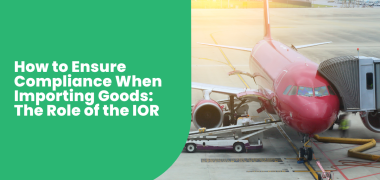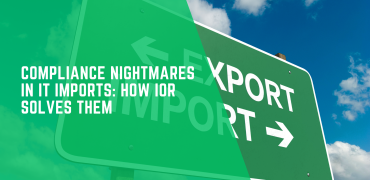In the increasingly globalized marketplace, businesses are constantly seeking opportunities to import goods from foreign markets to stay competitive and meet customer demands. However, importing goods involves navigating a complex web of regulations, tariffs, and documentation requirements. Ensuring compliance with these regulations is crucial to avoid costly delays, penalties, and potential legal issues. One of the key players in this process is the Importer of Record (IOR). This blog post will explore the critical role of the IOR in ensuring compliance when importing goods and provide a comprehensive guide on how to navigate this complex landscape.
Understanding the Importer of Record (IOR)
What is an Importer of Record?
The Importer of Record (IOR) is a legal entity or individual responsible for ensuring that imported goods comply with the regulations of the destination country. The IOR takes on several crucial responsibilities, including:
- Ensuring Regulatory Compliance: The IOR ensures that all import activities comply with the destination country’s legal and regulatory requirements.
- Managing Documentation: The IOR handles all necessary documentation, including invoices, packing lists, and certificates of origin.
- Paying Duties and Taxes: The IOR is responsible for calculating and paying any applicable duties, tariffs, and taxes.
- Assuming Legal Liability: The IOR assumes legal responsibility for the imported goods, ensuring that they meet all necessary standards and regulations.
The Importance of the IOR
The role of the IOR is critical in the import process for several reasons:
- Compliance Assurance: The IOR ensures that all aspects of the import process adhere to the legal and regulatory requirements, reducing the risk of non-compliance.
- Streamlined Operations: By handling the complexities of import documentation and customs procedures, the IOR helps streamline the import process, reducing delays and disruptions.
- Risk Mitigation: The IOR assumes legal liability for the imported goods, providing a level of security and assurance for businesses.
- Cost Efficiency: An experienced IOR can help avoid costly mistakes and penalties associated with non-compliance.
Key Compliance Considerations When Importing Goods
Understanding Regulatory Requirements
Different countries have distinct regulatory frameworks governing the importation of goods. These regulations can include product-specific requirements, safety standards, labeling and packaging mandates, and restrictions on certain types of goods. An IOR helps businesses understand and comply with these regulations, reducing the risk of non-compliance.
Accurate Classification of Goods
One of the key aspects of international trade regulations is the use of Harmonized System (HS) codes. HS codes are standardized numerical codes used to classify products for customs purposes. Accurate classification of goods using HS codes is essential for determining the applicable duties, taxes, and regulations. An experienced IOR will assist in correctly identifying and using HS codes for your products.
Obtaining Import Licenses and Permits
Certain goods may require import licenses or permits before they can be legally imported into a country. The IOR ensures that all necessary licenses and permits are obtained and that the import process adheres to the relevant regulatory requirements. This step is critical for avoiding delays and legal issues at customs.
Calculating Tariffs and Duties
Tariffs and duties are financial charges imposed by governments on imported goods. These charges vary depending on the type of product, its country of origin, and trade agreements in place. The IOR calculates the applicable tariffs and duties, ensuring accurate payment and compliance with financial regulations.
Managing Documentation and Record Keeping
Proper documentation is a cornerstone of successful international trade. The IOR manages the preparation and submission of all required documents, including commercial invoices, packing lists, bills of lading, and certificates of origin. Additionally, the IOR maintains meticulous records of all import transactions, which are essential for audits and future reference.
Navigating the Customs Clearance Process
The customs clearance process involves a series of steps to ensure that imported goods meet all regulatory requirements and are allowed entry into the destination country. The IOR handles this process on behalf of the importer, which includes:
- Pre-Arrival Processing: Submitting necessary documentation to customs authorities before the goods arrive.
- Inspection and Examination: Coordinating with customs officials for the inspection and examination of goods, if required.
- Duty Payment: Calculating and paying any applicable duties, taxes, and fees.
- Release of Goods: Ensuring that goods are released from customs and delivered to the final destination.
The Role of the IOR in Ensuring Compliance
Expertise and Knowledge
One of the primary reasons for engaging an IOR is their expertise and knowledge of international trade regulations. An experienced IOR is well-versed in the regulatory requirements of different countries and can provide valuable guidance to ensure compliance.
Risk Assessment and Management
An IOR conducts a thorough risk assessment to identify potential compliance issues and develop strategies to mitigate these risks. This proactive approach helps businesses avoid costly mistakes and ensures a smooth import process.
Compliance Audits
Regular compliance audits are essential to ensure that import activities adhere to regulatory requirements. An IOR conducts these audits to identify any discrepancies or areas of non-compliance and implement corrective actions as needed.
Training and Education
An IOR provides training and education to businesses on international trade regulations and compliance requirements. This training helps businesses stay informed about regulatory changes and ensures that employees are knowledgeable about compliance procedures.
Documentation Management
Proper documentation is crucial for compliance with international trade regulations. The IOR manages all necessary documentation, ensuring that it is accurate, complete, and submitted on time. This documentation includes:
- Commercial Invoices: Detailing the value and nature of the imported goods.
- Packing Lists: Providing information about the contents of each shipment.
- Bills of Lading: Serving as a receipt for the goods and a contract for their transport.
- Certificates of Origin: Verifying the country of origin of the goods.
Customs Brokerage Services
Many IORs also provide customs brokerage services, acting as intermediaries between the importer and customs authorities. These services include:
- Customs Declarations: Preparing and submitting customs declarations to ensure that goods are properly classified and taxed.
- Tariff and Duty Calculations: Determining the applicable tariffs and duties for imported goods.
- Customs Clearance: Facilitating the customs clearance process to ensure that goods are released in a timely manner.
Best Practices for Ensuring Compliance When Importing Goods
Choose the Right IOR
Selecting the right IOR is critical for ensuring compliance with international trade regulations. Consider the following factors when choosing an IOR:
- Expertise and Experience: Look for an IOR with extensive experience and expertise in handling the types of goods you plan to import.
- Geographic Coverage: Ensure that the IOR has a strong presence and knowledge of the regulatory environment in the countries where you plan to import goods.
- Reputation and Reliability: Research the reputation and reliability of potential IORs by seeking references, reading reviews, and checking their track record with previous clients.
- Range of Services: Evaluate the range of services offered by the IOR, including customs brokerage, documentation management, regulatory compliance, and post-clearance support.
Conduct Due Diligence
Conduct thorough due diligence when selecting an IOR. Verify their credentials and ensure they have the necessary licenses and permits to operate in the countries where you plan to import goods. This due diligence will help ensure that you are partnering with a reputable and reliable IOR.
Establish Clear Communication
Effective communication is essential when working with an IOR. Establish clear lines of communication and provide all necessary information about your products, shipping details, and regulatory requirements. Regular updates and transparent communication help ensure a smooth import process.
Collaborate and Coordinate
Collaborate closely with your IOR throughout the import process. Provide timely and accurate information, respond promptly to requests for documentation, and coordinate with them to address any issues that may arise during customs clearance.
Stay Informed About Regulatory Changes
International trade regulations are subject to change, and staying informed about updates and new requirements is crucial. Work with your IOR to stay updated on regulatory changes that may impact your imports and adjust your processes accordingly.
Leverage Technology
Many IORs utilize advanced technology and digital tools to streamline the import process. Take advantage of these technologies to enhance efficiency, track shipments, and manage documentation more effectively. This technology can include:
- Compliance Management Systems: Software that helps manage and track compliance requirements and documentation.
- Shipment Tracking Tools: Tools that provide real-time updates on the status of shipments and customs clearance.
- Electronic Document Management: Systems that facilitate the electronic submission and management of import documentation.
Conclusion
Ensuring compliance when importing goods is a complex and challenging task that requires a deep understanding of international trade regulations, meticulous documentation, and efficient customs clearance processes. The Importer of Record (IOR) plays a pivotal role in navigating these complexities, providing expertise, managing documentation, and ensuring compliance with regulatory requirements.
By choosing the right IOR, conducting due diligence, establishing clear communication, and staying informed about regulatory changes, businesses can successfully navigate the import process and minimize the risks associated with non-compliance. Leveraging the support and expertise of an IOR not only ensures compliance but also enhances the efficiency and reliability of the supply chain, allowing businesses to focus on their core operations and achieve their global trade objectives with confidence.
In summary, the role of the IOR is indispensable for businesses engaged in international trade. Their knowledge, experience, and comprehensive services help businesses overcome regulatory hurdles, mitigate risks, and ensure the seamless importation of goods. By partnering with a reliable IOR and following best practices, businesses can achieve compliance, streamline their import operations, and thrive in the global marketplace.




